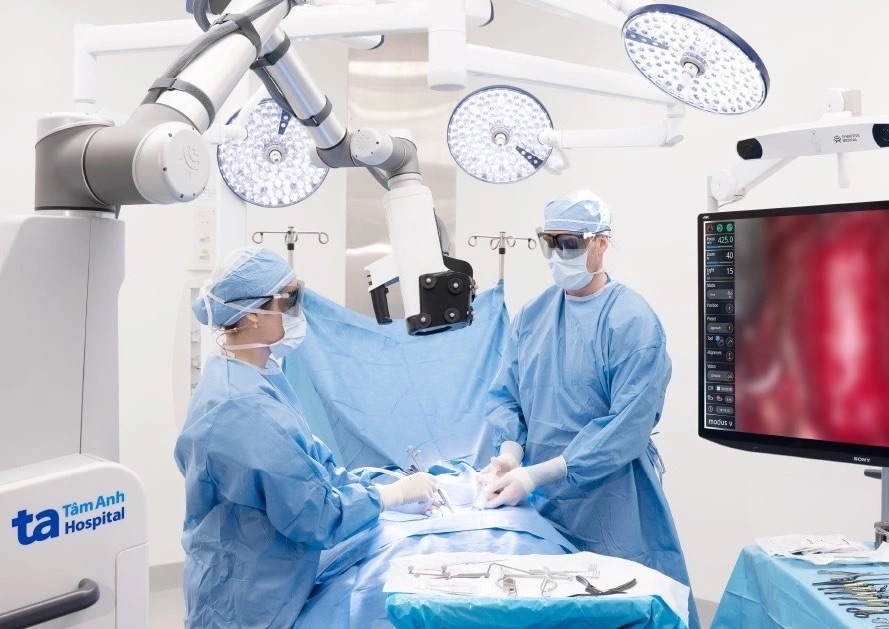The promise of real-time technologies is reshaping the healthcare industry and how care is delivered. From wearable devices that continuously monitor vital signs, to AI-driven diagnostics and telemedicine platforms, these innovations allow clinicians to make decisions as events unfold. For patients, it means faster diagnoses, proactive treatment, and more personalized care.
Globally, real-time healthcare is gaining momentum. While in Vietnam, the landscape is particularly promising. With a young, tech-savvy population, rising digital infrastructure, and supportive government policies, the country is emerging as a fertile ground for innovation in healthcare technology.
Vietnam’s Digital Health Landscape
Vietnam's healthcare sector has seen substantial growth in digital health initiatives. In 2024, the eHealth market was valued at USD 564 million and is projected to reach USD 2.06 billion by 2033, growing at a CAGR (Compound Annual Growth Rate) of 15.48% from 2025 to 2033. Similarly, the telemedicine market was valued at USD 460.3 million in 2024 and is expected to reach USD 2.7 billion by 2033, exhibiting a CAGR of 19.2% during 2025-2033. These figures underscore the increasing demand for digital health services in the country.
The government has been a key driver, promoting digital health policies and investing in telemedicine programs that connect thousands of clinics and hospitals across the country.
Initiatives like the development of a national electronic health record system, alongside the proliferation of hospital IT systems, provide the backbone for integrating real-time healthcare technologies.
Vietnam: An Ideal Market for Real-Time Healthcare
Several factors make Vietnam uniquely positioned for the adoption of real-time healthcare solutions. Its population of over 100 million is not only large but also predominantly young, with nearly half of the working-age population under 35. This demographic is naturally more open to technology, making them ideal early adopters of digital health innovations. High mobile penetration with over 127 million mobile connections and nearly 80 million internet users create the digital environment necessary for mobile-based healthcare platforms to thrive.

At the same time, the Vietnamese government has been actively fostering the development of digital infrastructure. Public telehealth programs have connected more than 1,000 health centers nationwide, enabling patients in rural or remote areas to access medical expertise without traveling long distances. For instance, Cho Ray Hospital in Ho Chi Minh City has partnered with several provincial hospitals to provide telemedicine consultations in oncology and cardiology, allowing doctors in remote areas to receive real-time specialist input for complex cases.
Private companies have also stepped in to support this evolution. Leading tech firm FPT recently began construction of a $174 million AI center in Binh Dinh province, focusing on research, software production, and cybersecurity, signaling a growing commitment from the private sector to integrate AI and other digital tools into healthcare.
Opportunities For Foreign Investors
For foreign investors and technology companies, Vietnam presents an enticing landscape. The combination of a rapidly expanding digital health market, supportive government policies, and a tech-ready population offers a clear path for innovation and growth. There are multiple entry points: foreign firms can establish wholly owned hospitals or clinics, create joint ventures with local partners, or collaborate with domestic technology providers.
The government’s investment-friendly stance, including alignment with international trade agreements and FTAs, makes this process more seamless. Moreover, the ongoing establishment of AI research centers and data hubs, including collaborations with global companies such as Nvidia and Google, signals a commitment to build the technological infrastructure required for advanced real-time healthcare solutions. Telemedicine, wearable devices, and AI-driven analytics all stand out as promising segments for investment.
Benefits To Vietnamese Citizens And Everyone Living In Vietnam
The rise of real-time healthcare technologies brings tangible benefits not only for Vietnamese citizens but for anyone living in the country. Telemedicine and remote monitoring make it easier to consult with doctors without traveling long distances, a particularly valuable advantage for residents in rural or underserved areas. Vietnam is steadily expanding telemedicine services across hospitals and clinics.
Thu Duc City Hospital in Ho Chi Minh City offers telepharmacy consultations, helping patients manage medications remotely, especially during COVID-19. Ho Chi Minh City Oncology Hospital has implemented telepathology in partnership with the University of Texas, enabling remote expert reviews and cutting diagnostic turnaround times by 30%. Meanwhile, private clinics like CarePlus International Clinic provide video consultations across multiple specialties via mobile apps, ensuring convenient healthcare access for both residents and foreigners.

Beyond improving health outcomes, digital health solutions help reduce the strain on overcrowded public hospitals, making the system more efficient for all patients. For those who opt for private healthcare, which remains relatively affordable compared with many other countries, real-time technologies enhance convenience, speed, and quality of care, making high-standard healthcare accessible to a broader segment of the population. Whether it’s through wearable devices, mobile apps, or remote consultations, everyone living in Vietnam stands to gain from this digital transformation in healthcare.
Challenges and Considerations
Despite the promising landscape, there are challenges to address.
Digital infrastructure, particularly in remote or mountainous regions, still requires significant investment to ensure consistent access to real-time healthcare services.
Data privacy and security must be carefully managed, with regulations to protect patient information.
For foreign investors, navigating local laws and healthcare regulations requires careful planning and local partnerships. Equally important is cultural acceptance where clinicians and patients alike need training and awareness to fully embrace these technologies.
Vietnam’s healthcare sector is poised for a digital revolution. With a supportive government, a digitally literate and young population, and rapid market growth, the country offers a unique opportunity for real-time healthcare technologies to take root.
For Vietnamese citizens, this promises more accessible, efficient, and personalized healthcare. For foreign investors and tech innovators, it represents an emerging market ripe for investment, collaboration, and long-term growth. In short, Vietnam is ready for real-time healthcare to become a hub for innovation that benefits both patients and global investors alike.
Hosted by Vietnam Innovators Digest, the Healthcare Summit 2025 themed by “Making Vietnam an Innovation Hub through Healthcare” will bring together healthcare leaders, investors, policymakers and innovators. This year's summit will be a dynamic convergence focused on healthcare innovation, investment and accessibility through digital health solutions. We will explore how investment and innovation can accelerate the healthcare transformation in Vietnam and beyond.
Date and Time: 9:00 AM - 4:00 PM, 24 October, 2025
Location: Ho Chi Minh city (Venue to be updated soon)
Event details: find out more HERE
